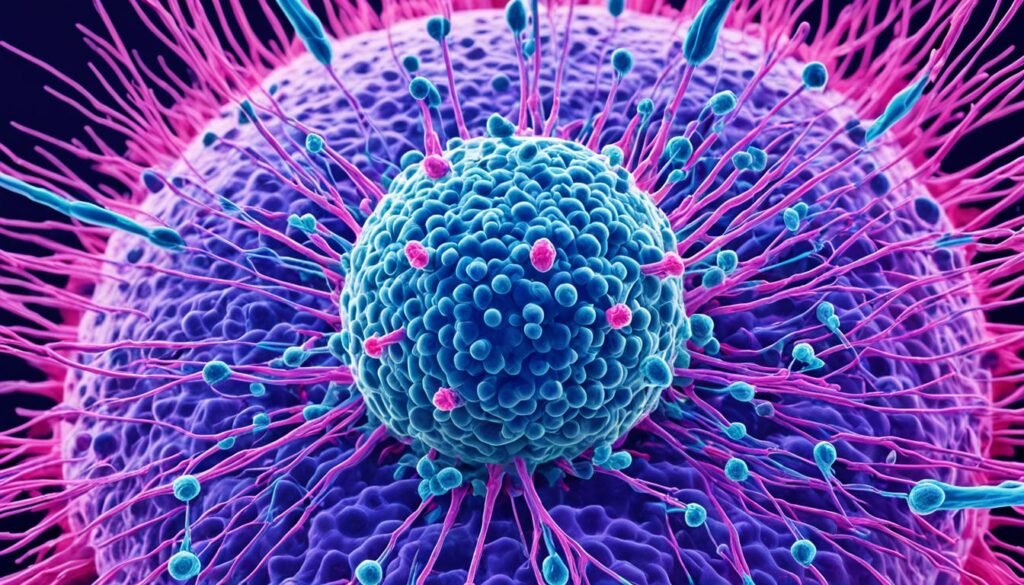“To keep the body in good health is a duty… otherwise we shall not be able to keep our mind strong and clear.” – Buddha
Enhertu shines as a major hope in the fight against cancer. It’s a new kind of targeted therapy that seeks to help those with HER2-positive cancers. This includes cancers of the breast, stomach, and some other solid tumors.
Daiichi Sankyo and AstraZeneca worked together to create Enhertu. Its impact is huge. The FDA called it a Breakthrough Therapy seven times.
Enhertu is crucial for people with HER2 overexpression. That’s when there’s too much HER2 in tumors. This new therapy is already changing the game for HER2-positive cancers.
Key Takeaways
- Enhertu is a breakthrough targeted therapy for HER2-positive cancers.
- Developed by Daiichi Sankyo and AstraZeneca, it has received multiple FDA Breakthrough Therapy Designations1.
- HER2 overexpression is observed in 1% to 28% of metastatic solid tumors1.
- Enhertu offers hope for patients with limited treatment options1.
- This transformative cancer treatment is making headway in treating various HER2-positive cancers1.
Introduction to Enhertu
Enhertu is a big step forward in treating HER2-positive metastatic breast cancer. It’s an innovative antibody drug conjugate. This medicine targets cancer cells directly, lessening damage to healthy tissues. It stands as an effective option instead of traditional chemotherapy.
What is Enhertu?
Enhertu focuses on sending chemotherapy straight to cancer cells. This means it hurts fewer healthy tissues. In clinics, it works really well. For example, many patients saw their tumors get smaller by using Enhertu2.
People with HER2-positive breast cancer who used Enhertu did better than those using a different medicine. They lived over a year without their cancer getting worse2. This was much longer than the folks on the other medicine who only went a few months without progression2.
Development Background
Daiichi Sankyo and AstraZeneca worked together to create Enhertu. They wanted to find better treatments for cancers that have too much HER2. Enhertu worked much better than regular chemo. More patients responded well to it, stopping the disease from growing for almost a year3.
For patients with low HER2, Enhertu also did great. It gave them about 10 months without the disease getting worse3.

FDA Approvals
Enhertu has been approved by the FDA for being very effective. In a key trial, it did much better than chemo. Over half of the patients responded well to Enhertu3.
This shows Enhertu is a solid choice. It helps many patients, even those with stomach cancers. In fact, it made tumors smaller in 42% of these patients2.
How Enhertu Works
Enhertu is special because it combines a HER2 monoclonal antibody with a cancer-killing payload. It targets HER2-positive cells commonly found in certain breast cancers. By doing this, it makes the treatment more effective against the cancer but spares healthy cells4. This approach results in a much bigger shrinkage of tumors, which is a big deal in fighting cancer5.

Studies like DESTINY-Breast03 and DESTINY-Breast04 showed great results with Enhertu. In the DESTINY-Breast03 study, 76% of patients saw their cancer controlled after a year. With another cancer treatment, only 34% managed5. During the DESTINY-Breast04 study, patients on Enhertu went without their cancer getting worse for nearly twice as long. They had an average of 10 months without any cancer growth, unlike those on normal chemotherapy whose average was only 5 months4. Also, 80% of patients treated with Enhertu saw their tumors shrink or disappear5.
But, using Enhertu also comes with possible side effects like changes in blood cells and liver issues. Nausea, vomiting, and hair loss are also common6. Even with these downsides, Enhertu still delivers more chemotherapy directly to the cancer cells than other treatments5. This direct targeting helps more effectively shrink tumors, showing how powerful Enhertu is in cancer care today.
- FDA approved for HER2-positive and HER2-low breast cancers
- Participants lived nearly twice as long without progression in clinical trials4
- Tumors shrank in 80% of patients5
The accuracy and targeted delivery of chemotherapy through Enhertu promise a new dawn in cancer treatment, ensuring not only effective tumor shrinkage but also the preservation of patients’ quality of life.
Enhertu for HER2-Positive Cancers
Enhertu marks a turning point in treating HER2-positive cancers. It’s a crucial choice for those with breast, gastric, and other solid tumors. These tumors must express HER2. Through clinical trials, Enhertu has shown its worth across various cancer types. This includes cases where treatment options were very few. It’s changing how we fight cancer, offering hope in difficult situations.
HER2-Positive Breast Cancer
Enhertu is making a big difference with metastatic breast cancer that’s HER2-positive. In the DESTINY-Breast06 trial, it led to a major improvement in how long patients went without their cancer progressing. This was compared to standard chemotherapy for those with HR-positive, HER2-low cancer7. Now, in more than 60 countries, Enhertu is a top choice for treating patients with these kinds of breast cancers7.
HER2-Positive Gastric Cancer
For those with HER2-positive gastric cancer, Enhertu brings new hope. The FDA has approved it for advanced HER2-positive tumors. This reflects its big potential to change the game8. Its role in treating HER2-positive gastric cancers confirms its leading position in cancer care7. The approval has opened up new treatment avenues, improving outcomes for patients worldwide.
Other HER2-Positive Solid Tumors
Enhertu isn’t just for breast and gastric cancers. It’s also proving valuable for other HER2-positive solid tumors. The DESTINY-PanTumor02 trial showed that patients responded well to Enhertu. They had a confirmed ORR of 51.4% and a DoR of 19.4 months on average9. It’s also working on cancers of the salivary gland, biliary tract, lung, and colorectal areas8. Each approval for different tumor types shows Enhertu’s vast potential. This makes it a key therapy, standing out in its class of treatments8.
Enhertu in Clinical Trials
The Enhertu clinical trials have changed how we fight cancer, especially in HER2-targetable cases. In Trial 1, Enhertu had an impressive ORR of 60.3%. This included a 4.3% CR and a 56.0% PR10. This shows how effective Enhertu is. The DOR was also long, lasting about 14.8 months10.
The DESTINY studies are key. They looked at trials like DESTINY-PanTumor02, with 267 people from North America, Asia, and Europe11. They focused on the ORR and other important factors like safety and OS11. Early results showed PFS and OS benefits to the patients11.
In the Phase III DESTINY-Breast03 trial, Enhertu showed good results. It treated patients with HER2-positive breast cancer. The results were similar among different demographics and across different ages. These trials have shown Enhertu is a versatile cancer treatment.
The current phase 3 Destiny-Breast05 trial looks at Enhertu against T-DM1. It’s for patients with high-risk HER2-positive early breast cancer. This trial plans to include up to 1,600 patients from about 400 sites worldwide12. Enhertu’s breakthrough designation and its U.S. and Japan approvals show its important role in cancer research12.
ENHERTU comes from Daiichi Sankyo and AstraZeneca working together. It’s part of a big worldwide effort to test its impact on different HER2 cancers12. The DESTINY studies and other tests have really highlighted Enhertu’s role in improving outcomes for patients. It’s a major advance in cancer research.
Enhertu Side Effects: What You Need to Know
Enhertu is very effective in fighting multiple types of cancers. But, it’s important to know the side effects it can have. This knowledge helps in handling the effects better.
Common Side Effects
It’s common to feel sick, tired, or lose hair when taking Enhertu. People with HER2-positive cancer might also have stomach issues like constipation or not wanting to eat1314.
Serious Side Effects
Some side effects of Enhertu need quick medical help. A big worry is ILD, a lung disease that can be very serious13. It can also affect your heart and how well your body fights off infections1315.
It’s vital to watch for a cough, hard to breathe feeling, or fever while on Enhertu1315.
Managing Side Effects
To deal with Enhertu’s side effects, stay ahead with health checks. Keeping an eye on your blood and heart can catch problems early. If you had lung or heart issues before, talk to your doctor first13.
Doctors need to watch out for side effects and act fast. This is very crucial, especially for serious problems like ILD or heart issues13.
| Common Side Effects | Serious Side Effects | Management Strategies |
|---|---|---|
| Nausea, anemia, fatigue, hair loss | Interstitial lung disease (ILD), reduced heart function, low white blood cell counts | Regular monitoring, blood tests, immediate medical consultation |
| Constipation, decreased appetite | Potential for severe allergic reactions | Proactive discussions with healthcare providers, early intervention |
Enhertu Dosage and Administration
Knowing the right Enhertu dosage is key for its success. It’s used to treat various cancers. Doctors may give 5.4 mg/kg for diseases like HER2-positive metastatic breast cancer. This is done every three weeks through an IV. For stomach cancer, the dose is a bit higher, at 6.4 mg/kg16.
If there are side effects, the dosage might change. For some cancers, the dose can be lower than the starting dose. This change is to help patients better handle the medicine. If someone has lung problems, doctors might stop the Enhertu and give other medicines too1718.
Preparing and giving this treatment the right way matters a lot. The medicine needs to be mixed carefully. First, it’s mixed with special water. Then, it’s added to a bag with another liquid. This is all to make sure the medicine is safe to use1716.
After mixing, the treatment must be kept in certain conditions. It can be in the fridge or at room temperature. But, it should never get too cold or freeze. Also, it must be kept away from direct light17.
The most common side effects are things like feeling sick, tired, and throwing up. These happen to many patients. Doctors closely watch these problems and may adjust the treatment if needed18.
| Condition | Recommended Dosage | Frequency |
|---|---|---|
| HER2-Positive Breast Cancer | 5.4 mg/kg | Every 3 weeks16 |
| HER2-Low Breast Cancer | 5.4 mg/kg | Every 3 weeks17 |
| NSCLC | 5.4 mg/kg | Every 3 weeks17 |
| Gastric Cancer | 6.4 mg/kg | Every 3 weeks17 |
| HER2-Positive Solid Tumors | 5.4 mg/kg | Every 3 weeks17 |
Healthcare workers must follow the enhertu prescribing information very carefully. This is the best way to make sure patients get the most benefit with the least risk16.
Patient Reviews and Real-World Results
Enhertu is getting a lot of positive attention from patients and experts. It’s doing a great job treating HER2-positive cancers. Real-life stories show how some have done really well, while others have faced tough obstacles. This mix gives a full view of the treatment’s potential.
Success Stories
Patient feedback on Enhertu is superb. It often means more time for those with HER2-low metastatic breast cancer. They might get an extra five months without their cancer getting worse than with other treatments19. In comparison, those on Enhertu lived about six months longer than those on regular chemotherapy19. This underlines just how impactful the drug can be in these stories of success.
Challenges Faced
Even with its triumphs, using Enhertu can bring some challenges. People might find it hard to deal with side effects and keep up with their treatment. But, by taking hints from real-life studies, doctors are finding ways to improve these issues. For instance, patients treated with Enhertu experienced about 16 months without their cancer worsening. And their chances of surviving without their cancer progressing for 6 or 12 months were 77.0% and 61.9%, showing a real promise20.
Expert Opinions
Experts in cancer therapy see Enhertu as a major step forward for HER2-related cancers. A study in the NEJM showed that it helps people live longer without their cancer spreading19. Important doctors also note that Enhertu has shown big benefits, helping over 70% of patients with HER2-positive brain cancer after six months20. They praise Enhertu for filling a crucial gap in cancer care, adding to the positive feedback about the drug.
Results from the DESTINY-Breast04 study are also promising. The study found that, for certain patients, those on Enhertu lived longer than those with other treatments. The median survival was almost 24 months with Enhertu, compared to about 17.5 months with other treatments21. This shows the solid case for Enhertu in cancer care.
real-world oncology outcomesexpert views on cancer treatment
| Outcome | Enhertu | Standard Chemotherapy |
|---|---|---|
| Progression-Free Survival | 5 months longer | – |
| Overall Survival | 6 months longer | – |
| PFS Rates at 6 Months | 77.0% | – |
| PFS Rates at 12 Months | 61.9% | – |
Comparing Enhertu with Other Cancer Therapies
Enhertu is a top choice in the fight against cancer. It’s especially good with HER2-positive cancers, like metastatic breast cancer. In studies, it showed more shrinking or disappearing tumors and longer time without the cancer getting worse compared to Kadcyla22. For those with HER2-low metastatic breast cancer, Enhertu also led to longer lives than chemotherapy did22. This means Enhertu is better at fighting cancer than traditional drugs.
In the DESTINY-Breast06 Phase III trial, Enhertu outperformed chemotherapy for HER2-low patients. It decreased the risk of the disease getting worse or dying by 38% and more patients responded to it than to chemotherapy23. These results show Enhertu is better than chemotherapy, bringing a stronger, longer-lasting effect against cancer.
Let’s not forget the cost of these therapies. Enhertu is more expensive than some, like Herceptin, yet it improves patient outcomes significantly. Its price reflects the value it brings22.
Setting money aside, Enhertu truly shines in the clinic. In the DESTINY-BREAST01 Phase 2 trials, more than half of patients responded well to Enhertu24. It also increased the survival time for those with HER2-low breast cancer, showing its great potential against other drugs24.
In the DESTINY-Breast07 trial, Enhertu did even better. When used alone, it led to a great response, and with pertuzumab, the response rate was even higher. This proves Enhertu’s excellence as an option in the HER2-targeted vs. chemotherapy debate23.
| Comparative Metrics | Enhertu | Chemotherapy |
|---|---|---|
| Tumor Shrinkage or Disappearance (HER2-positive) | 82.7% | 36.1% |
| Progression-Free Survival (HER2-positive) | 18.5 months | 5.6 months |
| Overall Median Survival (HER2-low) | 23.4 months | 16.8 months |
| Risk Reduction in Disease Progression (HER2-low) | 38% | — |
| Confirmed ORR (HER2-low) | 56.5% | 32.2% |
The Future of Enhertu in Oncology
The future of Enhertu in oncology looks really bright. It’s getting used for more types of cancer. Ongoing research points to better chances for patients to get well.
Ongoing Research
Research on Enhertu is trying to find its use in different cancers. In some types, like biliary tract and ovaries, it has worked well for over half of the patients. They felt the treatment’s impact for nearly 20 months25. Trials now mix it with other cancer drugs. This could make it even more effective26. Also, they are starting to test it on cancers at the early stage. This might make it useful for even more people26.
Potential New Indications
Enhertu could soon be used more widely. The FDA has allowed its use across different cancers25. This is a big move towards treatments tailored to each person’s needs25. Sales figures show it’s being used more in clinics. Its future in cancer care looks very promising26. As we move forward, we might see it being used even more widely.
| Metric | Value | Source |
|---|---|---|
| Overall Response Rate | 51% | 25 |
| Median Duration of Response | 19.4 months | 25 |
| Sales Growth | $1.25 Billion to $2.5 Billion | 26 |
| Annual Revenue | $2.3 Billion in 2023 | 27 |
| Patient Treatments | Over 81,000 | 27 |
In the end, Enhertu could really change how we treat cancer. It may give new hope to people all over the world. This future includes more types of cancer being treated with a personalized approach. It could mark a big shift in how we view and treat this disease.
Conclusion
Enhertu marks a big step forward in cancer care. It provides targeted options for HER2-positive cancers like breast, gastric, lung, and colorectal. In studies like the DESTINY-Breast03 Phase III, it outperformed usual treatments. This led to better progression-free survival and a hint at improved overall survival in HER2-positive breast cancer28. Enhertu clearly helps patients a lot.
It’s shown through several trials that Enhertu is changing how we fight cancer. Compared to Kadcyla, it significantly increased survival without the disease, improved overall response rate, and had a big effect on reducing the risk of death29. The DESTINY-Breast04 trial found that even HER2-low breast cancer patients benefited. This shows Enhertu might help across different HER2 types29.
Studies are checking if Enhertu works in more cancers safely. Results look forward to helping patients even more. With ongoing approvals in many places, Enhertu could change how we treat cancer worldwide28.
FAQ
What is Enhertu?
Enhertu is a special cancer drug that focuses on cancers with too much of a certain protein called HER2. It uses an antibody and a chemotherapy drug to treat these cancers without harming healthy cells.
Who developed Enhertu?
It was made by Daiichi Sankyo and AstraZeneca, companies big on fighting cancer with new medicines.
What cancers is Enhertu approved to treat?
It’s approved for HER2-positive breast and stomach cancers that have spread. It might also help with other cancers that have too much HER2.
How does Enhertu work?
Enhertu directly strikes at HER2 cancer cells. This helps to limit damage to healthy cells, unlike traditional chemotherapy.
What are the common side effects of Enhertu?
Nausea, anemia, and fatigue are usual. Talk to your doctor about these side effects to handle them well.
Are there serious side effects associated with Enhertu?
Yes, it can cause a serious lung problem. Monitoring closely can help avoid harms.
What should I know about the dosage and administration of Enhertu?
Dosages are set for each cancer type and patient. Following the prescription keeps the use of the drug safe and effective.
How is Enhertu different from traditional chemotherapy?
Enhertu targets only the cancer cells with too much HER2. This means it hurts fewer healthy cells than standard chemotherapy.
What are the DESTINY trials related to Enhertu?
These studies look into how safe and helpful Enhertu is for HER2 cancers. They helped get the drug approved and show its many uses.
What do patient reviews and real-world results indicate about Enhertu?
Feedback and data show Enhertu has changed the lives of those with HER2 cancers. Many say it works well, leading to better health.
What does the future hold for Enhertu in oncology?
Research and new uses could mean a bright future for Enhertu. It remains a key option in treating different types of cancer with precision.
How much does Enhertu cost?
Costs depend on the dose, how long the treatment is, and your healthcare provider. Check with your doctor and insurance for a clear cost idea.
Where can I find Enhertu prescribing information?
Your doctor or the companies’ websites can give you the detailed information about using Enhertu.
Source Links
- https://daiichisankyo.us/press-releases/-/article/enhertu-granted-two-breakthrough-therapy-designations-in-u-s-for-patients-across-multiple-her2-expressing-cancers – Press Releases – Daiichi Sankyo US
- https://www.ema.europa.eu/en/medicines/human/EPAR/enhertu – Enhertu | European Medicines Agency
- https://www.komen.org/breast-cancer/facts-statistics/research-studies/topics/trastuzumab-deruxtecan-enhertu-treatment-for-metastatic-breast-cancer/ – Trastuzumab Deruxtecan (Enhertu) for Metastatic Breast Cancer Treatment – Susan G. Komen®
- https://www.cancer.gov/news-events/cancer-currents-blog/2022/enhertu-her2-low-breast-cancer – Trastuzumab Deruxtecan for Metastatic HER2-Low Breast Cancer
- https://www.cancer.gov/news-events/cancer-currents-blog/2021/enhertu-her2-metastatic-breast-cancer – Enhertu Effective in HER2-Positive Metastatic Breast Cancer
- https://breastcancernow.org/about-breast-cancer/treatment/targeted-biological-therapy/trastuzumab-deruxtecan-enhertu/ – Trastuzumab deruxtecan (Enhertu)
- https://www.astrazeneca.com/media-centre/press-releases/2024/enhertu-improved-pfs-in-her2-low-and-ultralow.html – Enhertu demonstrated statistically significant and clinically meaningful improvement in progression-free survival in HR-positive, HER2-low metastatic breast cancer following one or more lines of endocrine therapy in DESTINY-Breast06 Phase III trial
- https://www.cancer.gov/news-events/cancer-currents-blog/2024/fda-enhertu-her2-positive-solid-tumors – Enhertu Approved for Any HER2-Positive Solid Cancer
- https://www.astrazeneca.com/media-centre/press-releases/2024/enhertu-approved-in-the-us-as-first-tumour-agnostic-her2-directed-therapy-for-previously-treated-patients-with-metastatic-her2-positive-solid-tumours.html – Enhertu approved in the US as first tumour-agnostic HER2-directed therapy for previously treated patients with metastatic HER2-positive solid tumours
- https://www.fda.gov/drugs/drug-approvals-and-databases/drug-trials-snapshot-enhertu – Drug Trials Snapshot: ENHERTU
- https://www.clinicaltrialsarena.com/news/enhertu-solid-tumour-trial/ – Enhertu offers survival benefits in Phase II solid tumour trial
- https://www.daiichisankyo.com/media/press_release/detail/index_4088.html – DESTINY-Breast05 Head-to-Head Phase 3 Trial of ENHERTU® Versus T-DM1 Initiated in Patients with HER2 Positive Early Breast Cancer at High Risk After Neo-adjuvant Therapy – Press Releases – Media
- https://www.medicalnewstoday.com/articles/drugs-enhertu-side-effects – Enhertu side effects: What to do about them
- https://www.healthline.com/health/drugs/enhertu-side-effects – Enhertu Side Effects: What They Are and How to Manage Them
- https://www.enhertu4u.com/patient/about-enhertu4u.html – About ENHERTU4U | ENHERTU4U (fam-trastuzumab deruxtecan-nxki) 20 mg/ml Injection for Intravenous Use
- https://reference.medscape.com/drug/enhertu-trastuzumab-deruxtecan-4000032 – Enhertu (trastuzumab deruxtecan) dosing, indications, interactions, adverse effects, and more
- https://www.drugs.com/dosage/enhertu.html – Enhertu Dosage Guide – Drugs.com
- https://www.accessdata.fda.gov/drugsatfda_docs/label/2019/761139s000lbl.pdf – label
- https://www.pharmexec.com/view/survival-story-enhertu – Survival Story: Enhertu
- https://www.onclive.com/view/trastuzumab-deruxtecan-demonstrates-real-world-intracranial-efficacy-in-metastatic-her2-breast-cancer – Trastuzumab Deruxtecan Demonstrates Real-World Intracranial Efficacy in Metastatic HER2+ Breast Cancer
- https://www.ncbi.nlm.nih.gov/books/NBK599780/ – Clinical Review – Trastuzumab deruxtecan (Enhertu)
- https://everyone.org/blog/enhertu-vs-herceptin – Enhertu vs Herceptin: What is the difference between these HER2-mutated cancer treatments?
- https://www.astrazeneca.com/media-centre/press-releases/2024/Enhertu-demonstrated-median-progression-free-survival-thirteen-months.html – Enhertu demonstrated a median progression-free survival of 13.2 months in HR-positive, HER2-low and HER2-ultralow metastatic breast cancer following one or more lines of endocrine therapy
- https://www.ncbi.nlm.nih.gov/pmc/articles/PMC9577648/ – Enhertu (Fam-trastuzumab-deruxtecan-nxki) – Revolutionizing treatment paradigm for HER2-Low breast cancer
- https://www.moffitt.org/endeavor/archive/fda-approves-enhertu-for-her2-positive-solid-tumors/ – FDA Approves Enhertu for HER2-Positive Solid Tumors
- https://www.pharmavoice.com/news/enhertu-daiichi-sankyo-astrazeneca-adc-ken-keller/715728/ – The Enhertu effect: Daiichi’s plan to build on the success of its crown jewel
- https://www.daiichisankyo.com/files/investors/library/materials/2023/March 2024 ENHERTU Business Briefing_E_Final.pdf – PDF
- https://www.astrazeneca.com/media-centre/press-releases/2021/enhertu-head-to-head-trial-meets-primary-endpoint.html – Enhertu significantly improved progression-free survival in DESTINY-Breast03 head-to-head trial vs. trastuzumab emtansine (T-DM1) in patients with HER2-positive metastatic breast cancer
- https://www.equinox-group.com/our-take-blog//enhertu-a-highly-innovative-therapy-for-second-line-metastatic-breast-cancer – Enhertu shows high clinical innovation in second-line metastatic breast cancer — Equinox Group




